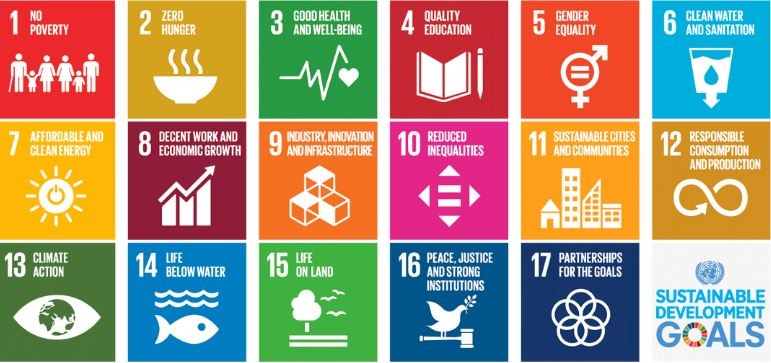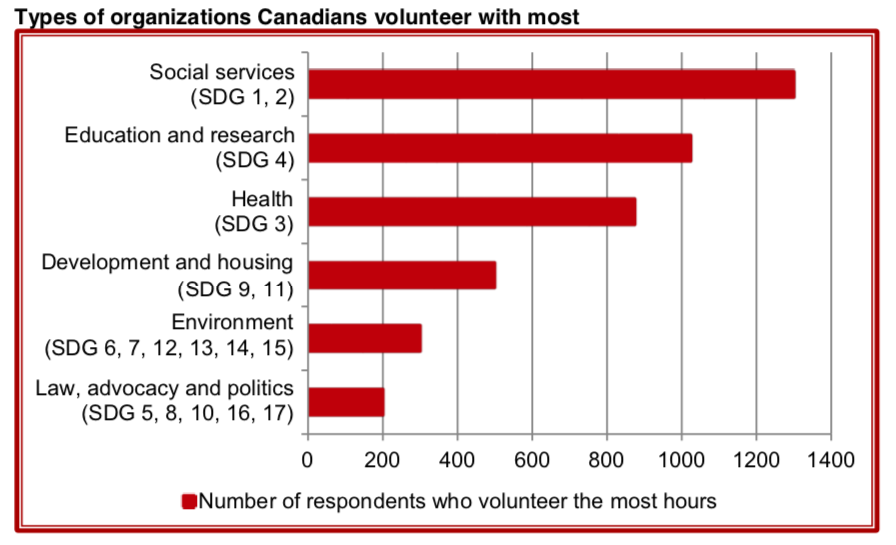- Home
- About Us
- The Team / Contact Us
- Books and Resources
- Privacy Policy
- Nonprofit Employer of Choice Award

In 2015, the United Nations General Assembly adopted 17 Sustainable Development Goals to mobilize global efforts to improve social, economic and environmental conditions around the world. Canada is one of 193 member states that agreed to work towards achieving these goals by 2030. Volunteer Canada was contracted by Employment and Social Development Canada to develop a national strategy to promote volunteering as a key component in achieving the 17 Sustainable Development Goals (SDG’s) with a focus on recruitment and recognition strategies for the non-profit sector. They explored the link between volunteering and the SDGs by analyzing existing data on volunteering, putting the goals in the Canadian context and gathering input from key stakeholders.

Linking the activities of Canadian volunteers and the organizations they support with the Sustainable Development Goals can help us achieve several objectives:
1. Raise awareness that the SDGs are relevant to Canadian communities.
The SDGs further the Millennium Development Goals by applying to all countries, not just developing ones. The SDGs challenge Canadians to think about how they can contribute, such as by helping reduce hunger and inequality in their communities.
2. Illustrate how volunteers already contribute to achieving these goals in Canada and abroad.
During the roundtables, we discussed our shared responsibility to look forward and broaden our understanding of how volunteers currently contribute to the goals. Many not-for-profits are tackling these difficult issues.
3. Demonstrate how community organizations are working to achieve the SDGs through their missions, programs, services and activities.
4. Identify areas where increased volunteer effort is needed.
By linking volunteer activities with the goals, we can see which goals are not getting as much attention and adjust our efforts. We can also increase volunteer engagement by using the SDGs as a framework to recruit volunteers and mobilize communities.
5. Communicate to volunteers their impact in a clear and compelling way.
The 2013 Volunteer Recognition Study indicated that volunteers are most motivated by knowing the impact of their efforts. The connection between effort and impact could motivate new and old volunteers alike.
Canadian volunteers contribute most of their time to the types of organizations that are associated with only one or two goals, like social services and education on research.
The types of organizations that are associated with the greatest number of goals, such as law, advocacy and political organizations, see fewer volunteers who contribute most of their time to that cause. This is not surprising as law, advocacy and political organizations are often concerned about losing their charitable status by engaging in the types of activities associated with the goals.
Direct-service organizations with charitable purposes aimed at alleviating poverty, education, religion, and community benefits are often reluctant to engage in efforts that promote systemic changes to improve peoples’ circumstances. This is because many organizations with charitable status are unclear as to how much of their resources they can devote to permissible political activities that advocate for public policy and legislative changes.
This stark difference could help us identify a gap that needs to be addressed to achieve the SDGs that relate to the environment. With few volunteers contributing most of their time to environmental causes, we may need to focus our efforts on mobilizing volunteers to further the environmental goals.

Canadian volunteers are already contributing to the Sustainable Development Goals. More research is needed to map updated data from the 2018 General Social Survey on Giving, Volunteering and Participating once it is released. It would be beneficial for not- for-profits, volunteer centres and federal departments to align their volunteer activities with the Sustainable Development Goals. This could enhance their credibility and increase resources for volunteer programs. Linking volunteering to the Sustainable Development Goals is seen as a compelling volunteer recruitment strategy.
Volunteer Canada wishes to acknowledge the Community Development and Homelessness Partnerships Directorate for their leadership on volunteering and their active collaboration in exploring how the activities of Canadian volunteers align with the SDGs. In particular, we wish to thank Carey Hill, Maya Nightingale, Biljana Savic and Greg Graves for shaping this project, convening roundtable discussions, co-creating content and reviewing drafts of this report. We also thank members of the Volunteer Canada network for their early research, editing and production support, including Lainie Towell, Samantha Dignam and Joanna Kaleniecka. Volunteer Canada appreciates the significant contributions made by the local volunteer centres that provided examples of community partnerships that address many of the issues related to the SDGs, such as food security, youth employment, literacy, clean water and gender equality. Finally, we wish to recognize the millions of Canadians who already volunteer in areas that directly contribute to achieving the SDGs.
Read the full report here.